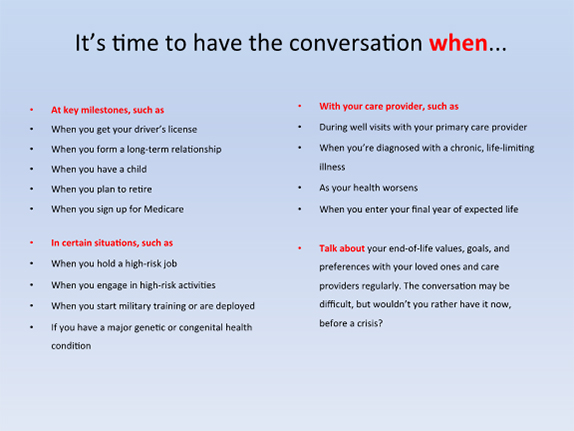
April 16, 2015 is National Health Care Decisions Day. It is a day when we are invited to take stock of our health status, ponder what matters to us medically, and discuss this with those who need to know.
On its website this grass roots initiative describes the problem it aims to solve:
“Despite recent gains in public awareness of the need for advance care planning, studies indicate that most Americans have not exercised their right to make decisions about their healthcare in the event that they cannot speak for themselves.”
When someone asks if you have undertaken advance care planning, what comes to mind? Living Wills? Advance Directives? Health Care Proxies? End of life decision making? Ventilators? Feeding Tubes? Intensive Care Units? Palliative Care? Physician Aid in Dying?
In the 1980s, some of us at UNM’s Institute of Public Law proposed a new way of thinking and talking about advance care planning: The Values History Form (click to download a free copy). Over the years, advance care planning has focused less on specific medical decisions and more on underlying values and health care goals.
I would like to propose a similarly radical change in the trajectory of advance care planning. What better occasion for a launch than on National Healthcare Decisions Day?
I think it is time to uncouple advance care planning from death and dying, from serious and terminal illness, from the prospect of incapacity, from old age. I also think it is time to shift the focus away from the “what” and more toward the “who,” away from the content of future health care decisions and toward people, dialogue and the present.
I am proposing this shift for a number of reasons.
1. Most of us postpone advance care planning until a crisis hits, or when our final horizon is undeniably in plain sight.
2. The subject matter (death, dying and incapacity) is off-putting, so we procrastinate.
3. End of life decision-making represents but a small percentage of the health care decisions we face over a lifetime.
4. When I talk with nurses and physicians and others in health care and ask them what helps them make good decisions with and on behalf of their patients, almost all agree. Decision-making succeeds when patients have talked with someone about their health care values, when this person is available to help them navigate the complicated health care/hospital environment, and when they have authorized this health care companion to speak and decide on their behalf when they cannot.
5. What matters to us becomes clearer when we try to explain it to someone else. As Miguel de Unamuno says, “Isolation is the worst counselor.”
6. When those “big ticket” decisions finally loom, whether in the form of a diagnosis of a terminal illness or those end of life decisions that inevitably accompany old age and declining health, we will have spent years talking with people about our health values. We and they will know how to have the conversation when we must.
I am proposing that each of us, from mid-adolescence on, select someone to be our Health Care Companion. It might be a parent, sibling, friend, partner, or adult child. Our Health Care Companion will likely change over the years, as circumstances themselves change. Likewise, what we talk about and what we value will shift over time.
My proposal stems from a recommendation found in last year’s Institute of Medicine (IOM) report, Dying in America (National Academy of Sciences, September 2014). The IOM describes a “life cycle model” approach to advance care planning. As we mature, the risks and responsibilities pertaining to our health change in quite predictable ways and stages:

Conversations matter. In New Mexico we are piggybacking onto The Conversation Project, a national, grass roots initiative started by Ellen Goodman and housed in the Institute for Healthcare Improvement. The project is “... dedicated to helping people talk about their wishes for end-of-life care.” To date over 150 communities across the country are developing their own Conversation Project offshoots, tailored to their local needs and resources.
Our Conversation Project in New Mexico (NMCP) will offer lay and professional New Mexicans useful resources for starting and sustaining conversations about health care decision-making. NMCP will announce and support programs and speakers on health care decision-making and advance care planning. We will provide high quality translations of documents into languages spoken by New Mexicans, and will work with a variety of community groups to develop approaches that work for our state’s diverse cultures.
It is under the umbrella of our Conversation Project in New Mexico that we will pilot the Health Care Companion project. We have begun to develop age/stage-appropriate materials that target different groups where they live, work and worship.
We intend to grow a generation of capable health care decision makers and Health Care Companions, who know how to describe their own health care values and use them to make good decisions throughout their lives.
Normalizing the conversation throughout life is our goal. Finding and continuing to talk with a Health Care Companion is the way.
What’s death got to do with it? Not much, until it does.
My late husband received a kidney from a 17-year-old who died in a tragic mountain bike accident. His parents and siblings had to make the decision about organ donation? Had the family talked?
Have you?
Find your Health Care Companion. Start the conversation. Today.



Responses to “What’s Death Got to Do with It?”